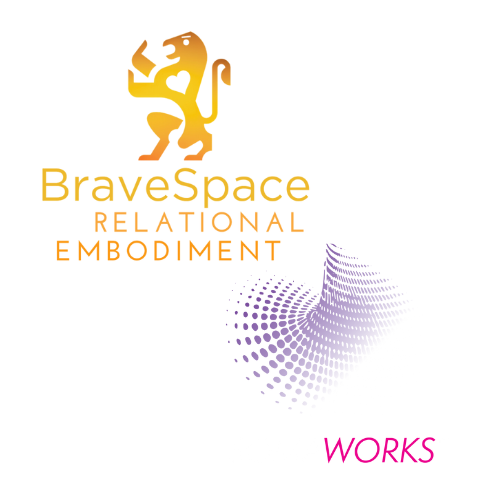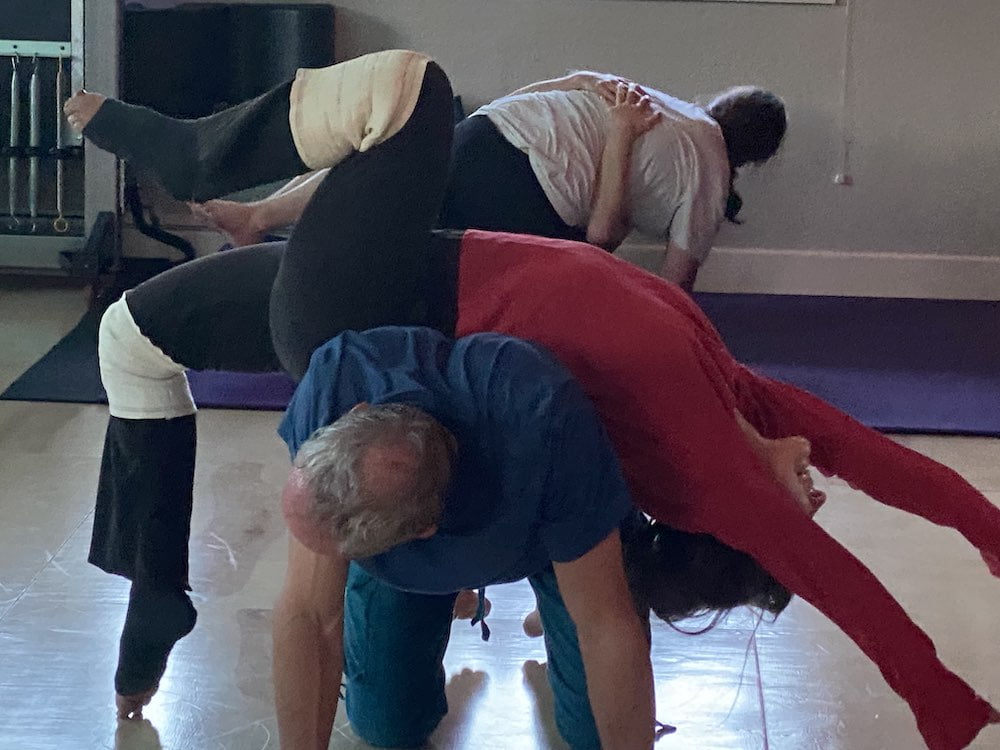BraveSpace Contact Temple
BraveSpace® is about expanding your ability to connect with others while simultaneously maintaining your own wholeness. The dance of Contact Improvisation (CI) nurtures and tests this skillset directly and playfully. CI is built on a simple experimental premise: What if we dance in connection with each other without any choreography? CI and Somatic Practice have grown up together (CI began in the 1970’s) because the premise of both is the ability to move with awareness, letting sensory attunement lead the way. CI takes this somatic experiment a step further by literally putting us in touch with each other. The somatic framework of BraveSpace is built on the social dynamics of CI.
The BraveSpace Contact Temple is a CI class and jam, with music, guidance, playtime, and some discussion. The study of CI is simultaneously physical, social, and spiritual. The BraveSpace Contact Temple acknowledges each of these dimensions and offers support for you to take what you learn in the studio out into the rest of your life.
You do not need experience with CI to participate. This container is trauma-aware, but you may want to begin with a 1-1 session with Matthew before coming to this group if you carry trauma around touch and your body. Reach out to Matthew (thewnelson@gmail.com) if you have questions.
Led by Matthew Nelson with an assistant.
At SomaWorks Studio: 750 E. Warm Springs Ave., Entrance and parking on Bannock, 2nd floor
Wear clothing without buckles or belts that moves easily.
$20 at the door. Further donations always appreciated.
BraveSpace® is a way of being together that acknowledges the primacy of the body for navigating how we relate, generating an environment safe enough to take the risk of being vulnerable.
Holding BraveSpace® together has fundamental principles:
- Somatic Research: We notice the sensations, emotions, images, and movements that we can perceive in our bodies. We collect this data without jumping to conclusions about its meaning or significance prematurely. Simultaneously, we recognize that the truth of our bodies cannot be manipulated away by our minds.
- De-shaming: We recognize our bodies as nature, both wild and civilized. We recognize and hold our judgements lightly in order to openly witness ourselves and each other. While we mindfully choose our actions, we release the need to control our experience, asking of our bodies and each other’s bodies what is being revealed through our perceptions.
- Trans-formation: We recognize that our movements and personalities are comprised of patterns that take form in our bodies and behaviors, and that these patterns may include traumatic responses. We are willing to change our form, face trauma, and invite discomfort in order to grow in alignment with purpose, truth, and community. We simultaneously seek to avoid injury to self, other, and world.
- Improvisation: We invite awe and wonder as we inhabit the mysterious gap between knowing and not knowing. We allow truth to emerge through us and recognize power as the ability to be with what is.
- Response-ability: We reposition ourselves in relation to others and the world in each moment seeking our consensual and coherent place of belonging. If we become overwhelmed, frozen, or otherwise unable to respond we do our best to speak to it openly and honestly. We do not attempt to control others’ actions in order to avoid shifting our own relationship to the external world, although we may share our perspectives and invite change.
- Heart-Centeredness: We recognize our hearts as portals to spirit and communal consciousness, with the potential to guide us through the limitations of our minds and individual identities. We embody qualities of unconditional love, healing presence, innate harmony, and compassion by calling our attention and energy back to our hearts and to the communal heart.
- Tensegrity: We recognize tensional integrity as a systemic wholeness of our physical bodies in space and also of the interpersonal and spiritual realms we inhabit together. We value and hold the tension of opposites as a necessary and healthy aspect of consciousness, and as a key to improvisational emergence.
- Risk: We recognize life as a place of inherent mortality and choose in BraveSpace the risk of intimacy with ourselves, each other, and the divine, knowing that none of us will complete our journey on this planet alive. Every phrase has a beginning, a middle, and an end. We embrace fear without being led by it.
- Eros: We recognize our bodies are charged with a force of life that is inherently erotic and which manifests differently for each of us. We celebrate our pleasure, vitality, and longing by meeting masculine and feminine dynamics within ourselves. In BraveSpace we direct sexual energy that may wish to fixate on others into making love with spirit in its many forms, including attuning with others.
- Interbeing: We recognize that we are simultaneously individual and collectively conscious beings in concert with an animate world. We attune to and contribute to communal fields of consciousness by noting our own values and preferences, voicing and moving them as they are given to us to share, and being willing to release them to impermanence.

